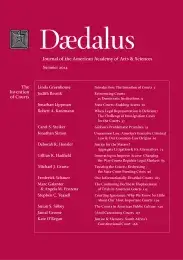Courting Ignorance: Why We Know So Little About Our Most Important Courts
Most of the United States' judicial work takes place in the country's state trial courts. These tribunals preside over everything from traffic tickets to murder trials, from routine debt collection to massive environmental torts. Given their expansive role, the manner in which these courts function is of immense significance. But ultimately, we know very little about these institutions. Our ignorance flows both from trivial bureaucratic turf battles and from deeply rooted principles of local government, a phenomenon I have called “data federalism.” In the last few decades, we have begun to form a partial image of the activities of these organs of government; but we know almost nothing about their past, and the little we do know suggests the dangers of extrapolation. This essay explores the extent of our ignorance of state trial courts and the difficulties of overcoming it.
Moving into the second decade of the twenty-first century, the United States finds itself in a paradox. To an extent not always recognized, the United States depends on state trial courts to run the world’s largest economy and coordinate its mechanisms of social control. But as we drown in data about everything else under the sun, we know remarkably little about how those courts actually work. We are struggling our way to some information about the current situation, but we know almost nothing about the workings of our local-level judicial system for any period before the 1980s. This essay seeks to explore how little we know and explain why we know so little. Beyond that, it traces the roots of our ignorance to choices about fundamental political structure that date to the founding of the American republic. These choices did not make our ignorance inevitable, but they made it likely, and they continue to make it difficult to overcome (however desirable that may be).
Start with the obvious: courts matter. Courts are basic retail-level agencies of government that have the added burden of dealing almost entirely with people in conflict. Genuinely uncontested divorces . . .
